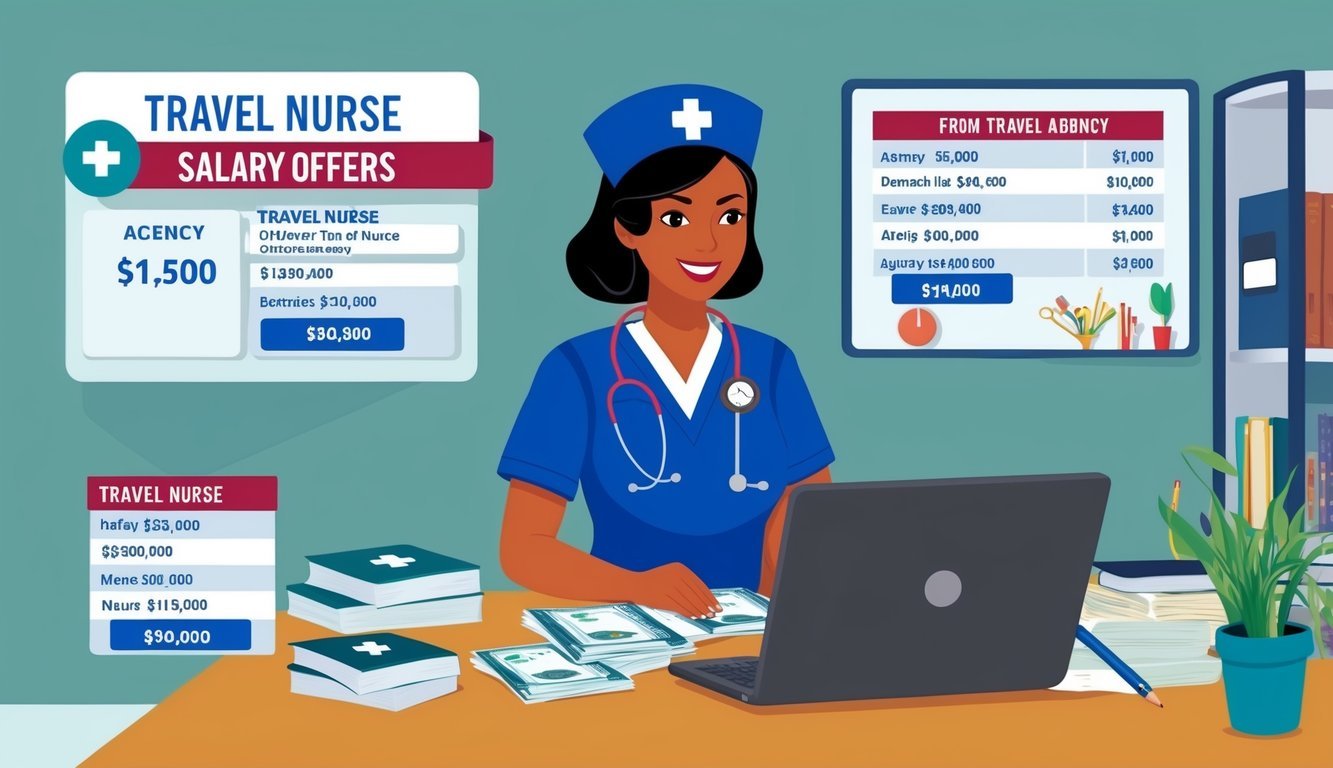If you are considering a career in travel nursing, understanding the salary landscape is crucial. The average annual travel nurse salary in the U.S. is approximately $105,021, significantly higher than the standard registered nurse salary of around $81,220.
Factors such as contract length, specialty, and location can greatly influence your earning potential.
Travel nurses often enjoy flexibility and the opportunity to earn attractive pay through various assignments across the country.
According to data from ZipRecruiter, the top-paying states for travel nurses include New York, Vermont, and California, while states like Florida and Arkansas report lower salaries.
Exploring different locations can lead to both professional growth and increased financial rewards.
As the demand for healthcare professionals continues to rise, travel nursing presents an appealing option for those seeking variety in their career.
By leveraging your skills in different environments, you can not only enhance your experience but also maximize your earnings in this dynamic field.
For more detailed insights, check out resources like Travel Nursing.org.
Understanding Travel Nurse Salary
Travel nurse salaries can significantly vary based on multiple factors, including location, experience, and specialty.
Understanding the components of a travel nurse pay package will help you gauge potential earnings and benefits effectively.
Components of a Travel Nurse Pay Package
A travel nurse’s pay package typically includes several components that contribute to your overall compensation.
These can be broken down as follows:
| Component | Description |
|---|---|
| Hourly Rate | Average hourly rates can reach $64.58, with some areas like New York offering up to $61.67. |
| Weekly Pay | You may earn around $2,324.92 weekly, depending on the location and facility. |
| Annual Salary | The national average salary for travel nurses is approximately $101,132. |
| Housing Stipends | Many packages include non-taxable stipends, which can exceed $2,000 per month. |
| Travel Reimbursements | Often, nurses receive a flat rate payment for travel costs, typically around $500. |
| Completion Bonuses | A common incentive is a bonus—often $1,000—upon contract completion. |
These components combine to create a competitive pay structure that often exceeds that of permanent staff positions.
Comparing Travel Nurse Salary to Permanent Staff
When comparing travel nurse salaries to those of permanent staff, several key differences emerge.
Travel nurses generally earn higher pay for a shorter-term commitment, reflecting the demand for flexibility.
-
Higher Pay: Travel nurses make about 25% more than their permanent counterparts, with additional incentives like completion bonuses and non-taxable stipends contributing to overall earnings.
-
Contract Duration: Permanent staff often have less flexibility in hours and location, while travel nurses contract for specific periods, allowing for potentially higher hourly rates.
-
Benefits Variation: While permanent positions might offer stable benefits like health insurance, travel nurses typically receive stipends that may not be taxed, enhancing their take-home pay.
Understanding these differences will enable you to make an informed decision about pursuing a career in travel nursing.
For further exploration, you can check out resources like Travel Nurse Salary 2024 for more details on pay rates by state.
Determinants of Travel Nurse Income
Several factors significantly impact your income as a travel nurse.
Key elements include your nursing specialty, geographical location, and level of professional experience.
Understanding these determinants can help you maximize your earning potential.
Influence of Nursing Specialty on Salary
Your nursing specialty plays a crucial role in determining your income.
High-demand specialties often command higher salaries due to shortages in specific areas.
For instance, specialties such as critical care, emergency room, and labor and delivery nursing typically offer higher pay rates.
Here’s a brief overview of some of the highest-paying travel nurse specialties:
| Specialty | Average Annual Salary |
|---|---|
| Critical Care | $125,000 |
| Emergency Room | $121,000 |
| Labor and Delivery | $115,000 |
| Operating Room | $112,000 |
These figures can vary widely depending on location and facility type, making it vital to research which specialty aligns with both your skills and earning goals.
Geographical Impact on Travel Nurse Salaries
The state where you work also greatly affects your salary.
Certain states are known for offering competitive pay rates to attract travel nurses.
New York, for example, tops the list, with annual salaries reaching approximately $128,277, or about $61.67 per hour.
Here’s a comparison of some of the highest-paying states:
| State | Average Annual Salary | Hourly Rate |
|---|---|---|
| New York | $128,277 | $61.67 |
| California | $125,000 | $60.00 |
| Arizona | $109,776 | $52.78 |
| Wyoming | $109,765 | $52.77 |
Consider the location of your assignments when evaluating potential earnings.
States facing nursing shortages often pay more to attract skilled professionals.
The Role of Professional Experience and Credentials
Your level of experience and advanced credentials can significantly influence your salary.
Travel nurses with specialized certifications or additional training often qualify for higher pay rates.
For example, a nurse with a Certified Registered Nurse Anesthetist (CRNA) designation can earn substantially more than a registered nurse without such credentials.
Moreover, your years of experience can directly impact your negotiating power.
Generally, more experienced nurses can command higher salaries and may also receive better benefits.
Benefits and Stipends for Travel Nurses
As a travel nurse, you can access various benefits and stipends that can significantly enhance your earning potential and job satisfaction.
Understanding these components is essential for maximizing your overall compensation package.
Understanding Housing Stipends
Housing stipends are a vital component of your compensation as a travel nurse.
These stipends help cover your housing costs during assignments and can be significant in offsetting living expenses.
Most agencies offer non-taxable housing stipends, which means you can receive this money without it being subject to taxes.
This setup allows you to keep more of your earnings.
The amount can vary based on location and contract specifics.
For instance, major cities like New York may offer higher stipends compared to rural areas.
Always check with your agency for precise figures.
Health and Wellness Benefits
Health and wellness benefits are crucial for your well-being while working in different locations.
Many travel nursing agencies provide health insurance options, including medical, dental, and vision coverage.
You might also find additional wellness perks such as gym memberships or mental health support.
This is particularly important given the demanding nature of the job.
Having these benefits can enhance your work-life balance.
Make sure to inquire about portability of your health insurance.
Some agencies allow you to maintain coverage regardless of your assignment location, which can reduce the hassle of changing providers frequently.
Referral Bonuses and Other Incentives
Referral bonuses are an excellent way to boost your income as a travel nurse.
Many agencies offer bonuses when you refer fellow nurses to their services, which can range from $500 to $2,000.
In addition to referral bonuses, various agencies may offer incentives like completion bonuses or performance bonuses based on your contract length and the quality of your work.
These bonuses can add a considerable amount to your overall salary.
Review your contract carefully to understand the specific requirements and conditions for these incentives, ensuring you make the most of your opportunities.
Employment Opportunities and Market Demand

The travel nursing landscape is shaped by an increasing demand for specialized healthcare professionals, driven largely by nursing shortages.
Understanding the intricacies of travel nurse contracts and the trends influencing job availability is essential for maximizing career opportunities.
Navigating Travel Nurse Contracts
When securing a travel nursing position, you will encounter various types of contracts that differ based on location, duration, and facility.
Common contracts include 13-week, 26-week, and per diem options, each offering unique benefits and obligations.
It’s crucial to evaluate the details of each contract, such as pay rates, housing stipends, and benefits like health insurance.
Make sure to communicate openly with recruiters to clarify any uncertainties.
Here are key points to consider:
| Contract Type | Duration | Typical Benefits |
|---|---|---|
| 13-week | 3 months | Competitive pay, housing |
| 26-week | 6 months | Higher stability, full benefits |
| Per Diem | Flexible | Pay for shifts, no housing |
Understanding these elements helps you make informed decisions regarding travel nursing jobs.
Trends in Nursing Shortages and Demand
The nursing shortage remains a critical issue, particularly for specialties like ER and ICU nursing.
As of recent reports, the U.S. faces a projected shortfall of about 1.1 million nurses by 2027.
This scarcity drives up demand for travel nurses, particularly in underserved areas.
Travel nurse opportunities are increasing due to:
- Aging Population: An aging demographic leads to higher healthcare needs.
- Pandemic Effects: The COVID-19 pandemic has intensified staffing needs in hospitals.
- Resistance to Market Fluctuations: Travel nursing offers flexibility amid job market fluctuations, making it an appealing option for many healthcare professionals.
By staying aware of these trends, you can better position yourself to take advantage of lucrative travel nursing roles.
Choosing the Right Travel Nursing Agency

Selecting the appropriate travel nursing agency is crucial for your career satisfaction and financial well-being.
Consider both the reputation of the agency and the pay rates and benefits they offer.
Evaluating Agency Reputation and Support
To ensure a positive experience, start by researching the reputation of potential travel nursing agencies.
Look for agencies that have been rated highly by other nurses.
Online reviews and ratings can provide insights into the agency’s reliability.
Consider whether the agency offers 24-hour support.
This is essential, especially when you encounter issues while on assignment.
A supportive agency can help navigate housing, contracts, and any workplace challenges that may arise.
Key factors to evaluate include:
- Years in business
- Nurse testimonials
- Availability of a 24/7 support team
Comparing Agency Pay Rates and Benefits
Pay rates can significantly vary between agencies. You should compare salary offers to ensure you’re getting a competitive rate.
The average annual salary for travel nurses is approximately $106,030, but it can exceed that based on location and specialty.
Look at the total compensation package.
This includes housing stipends, health insurance coverage, retirement plans, and travel reimbursements.
Many agencies provide benefits that can enhance your earnings.
For example, free housing or generous stipends can greatly improve your financial situation.
Utilize tools like TravelNursing.org to research different agencies and find the one that best meets your needs.

